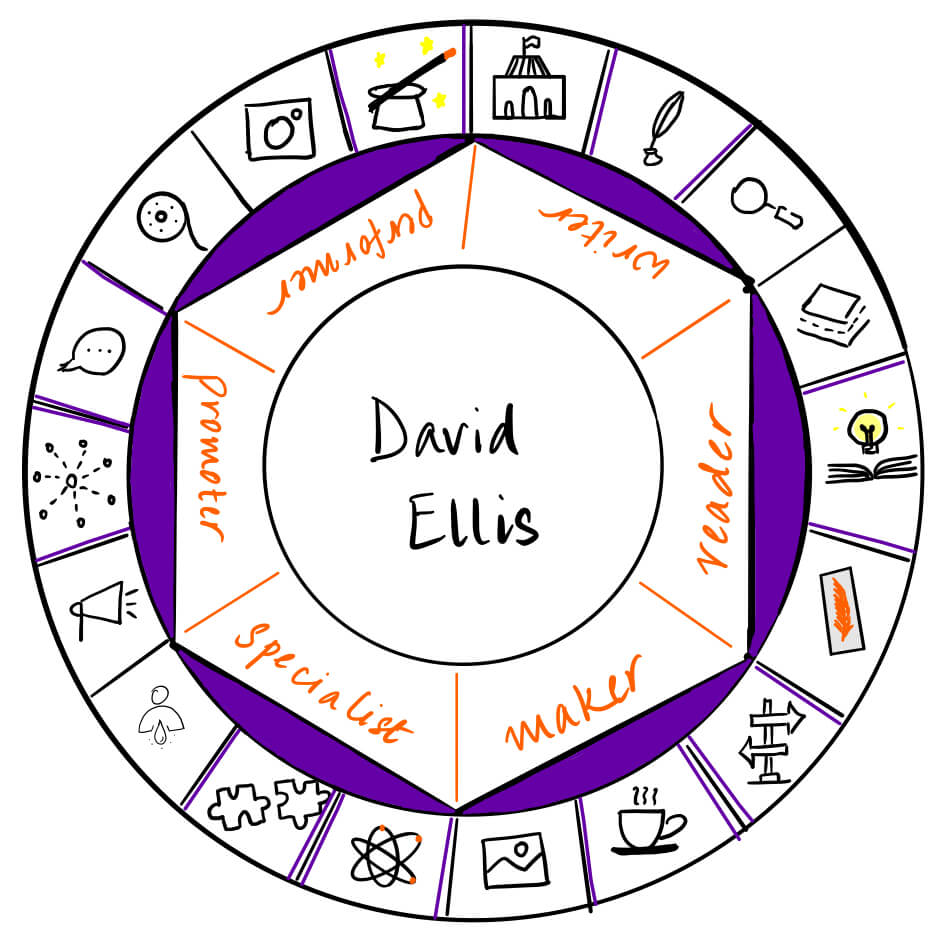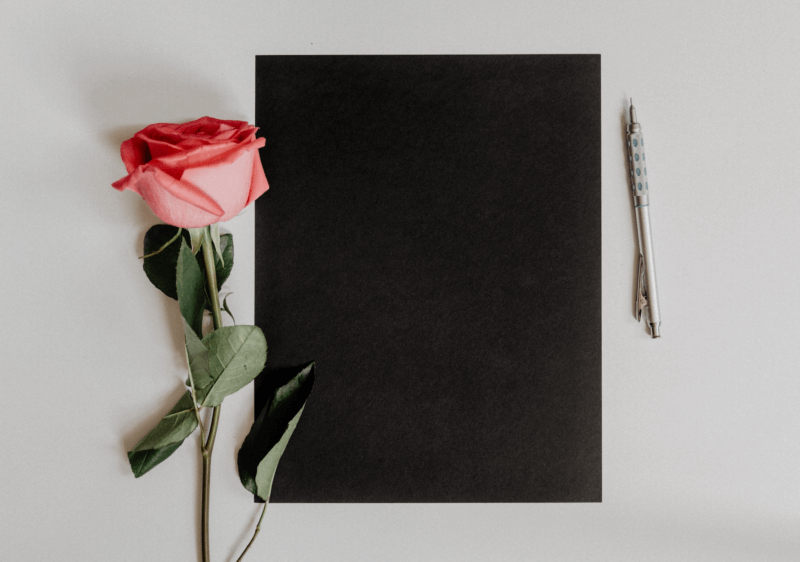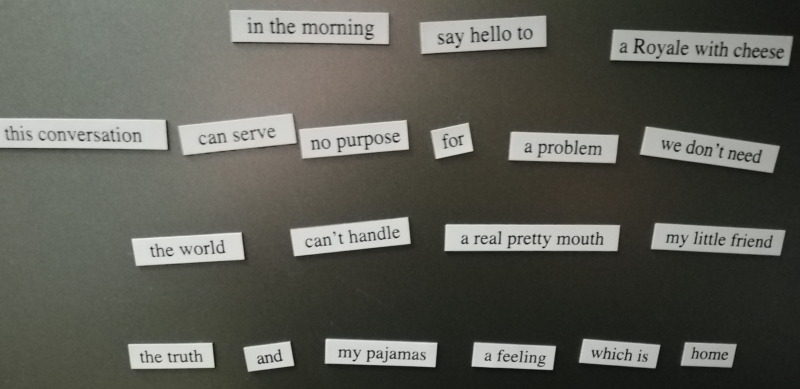
The last year got me back into reading poetry, starting with Frank Prem’s Devil in the Wind and it has been a pleasure to talk to Julian Peters about creating comics for poems in a Creator’s Roulette post last month. Have you heard of ‘found poetry’ though? It wasn’t until I picked up David Ellis’ See A Dream Within that I engaged with found poetry for the first time. I have come across blackout poetry, which is being creative using the words on the page and there are beautiful examples of that. However, found poetry is a bit different. I’ve David Ellis here himself to tell me more about it.
Welcome to Creator’s Roulette, David! How did you get into creating found poetry?
Hi there Kriti, thank you for having me here on Creator’s Roulette, I really appreciate it! I’ve actually been writing music lyrics and different types of poetry for many years. It is only in the last couple of years that I have tried writing found poetry and I completely fell in love with it. I would have to say that it is my favourite type of poetry style because there are literally infinite amounts of inspiration available for it out there!
The gist of found poetry is that you select a piece of writing (this can be words, phrases or whole passages) and then pick out words that you like and you then build entirely new poetry out of this text.
I first started creating found poetry as part of a series of daily poetry challenges that take place in April of every year (National Poetry Writing Month), where you write thirty poems in thirty days. Up until that point, I had been trying out a variety of poetic styles, mostly around fixed word or syllable counts. One of the challenges really stood out to me and I wrote my own simple poem, inspired by a poem written by Edna St Vincent Millay called “Spring”. Based on the reader feedback that I got from publishing that found poem on my blog, I started writing many more found poems. I am addicted to the form because often the results are unpredictable and not very typical of the usual freeform poetry that I compose, which makes the result even more magical when the poem is completed!
I’ve actually been experimenting by applying a found poetry mentality to other traditional poetry forms as well. The only limits are your own creativity and imagination.
If I wanted to try my hand at found poetry, what do I need to do it? Does it always have to come from other poems or short stories? Also, is there an art form where people write stories from other stories?

You can pretty much write found poetry from any written medium that you can think of – articles, novels, short stories, plays, film scripts, manuals, guides, etc. I would say that the more words the writing source has the better, if you want to compose a nice long piece yourself. When I wrote my Edgar Allan Poe poetry book, I simply just had to write short poems because most of Edgar’s poems were very short in the first place, which limited my use of word choice. I hope to explore the other end of this spectrum by writing a follow-up book that uses all of Edgar’s short stories as my inspiration, including the one play that he wrote, in order to create much longer poems.
Regarding the second part of your question, I’ve never done it but you could actually try writing “found stories” but the only problem with found writing is that you end up having to cut out a lot of content to write your own piece. I imagine that you could try writing flash fiction from poems or texts that run over several pages or longer, since flash fiction is such a short medium to work with. The whole point of found writing is to cut out enough content of the original text, so that you can make coherent sentences that are completely different to the source material and that also avoid any unintentional plagiarism.
I would imagine that you could write a found short story from a novel but you would have to avoid using any copyrighted characters, locations or plot settings from the novel itself. My rule of thumb is that usually you end up using a tenth of what you are sampling from, so a novel of 80,000 to 100,000 words could in theory generate enough material for a found short story. Something for me to experiment with in the future, perhaps!
Are there other forms of poetry similar to found poetry that you know of or have engaged in?
I have actually tinkered with a couple of other forms that are similar to found poetry.
- Magnetic Poetry – This is where you get together a series of words (you can buy fridge magnet kits or cut up a load of words from magazines and newspapers) and then you experiment by rearranging the words into sentences. I have a magnetic poetry kit comprised of lines of dialogue from famous movies and I wrote a poem with them that I have included here.

- Phonetic Translation – This is similar to translating a poem from a foreign language into English but the twist is that you don’t translate a language you know and sound the words out phonetically for a language that you don’t know! This really does work best for languages that you have never studied before because you are forced to give certain words your own interpretation and rhythm, which could be totally different to their English translation.
Below is an excerpt from a poem that I sampled using this technique written in Italian (“NEVER HAVING HAD TRUE PEACE” by Massimo Morasso) and an excerpt from my own found translation poem (“Spectres of Speeches and Letters”).
Senza mai vera pace,
“NEVER HAVING HAD TRUE PEACE” by Massimo Morasso (Excerpt)
torno anche stanotte ai miei fantasmi,
ne ascolto la voce ipnotica, rupestre,
che a poco a poco si fa una e penetra
le imposte, fuori tempo, inarrestabile.
È bastato che morissero i miei,
e i ricordi
sbattono le ali, uccelli neri
che mi osservano, più vigili di un faro,
da un cielo ulteriore, interiore.
Life at our own pace,
turning artistic expressions into a myriad of fantasies,
no choice but to accept their hypnotic voices, resplendent,
from place to place, they fascinate, penetrate
impossible to ignore, fast-paced, irresistible.It basically means everything, the world to you and me
“Spectres of Speeches and Letters” by David Ellis (Excerpt)
we are enriched
battling our way through, understanding nuances
to those who observe us, if you fight, then make it fair,
what matters most is what’s inside that counts.
You have a number of poems inspired by Edgar Allan Poe. Tell me more about him and being introduced to his work.
Edgar Allan Poe is a very fascinating individual. I feel very connected to him and his words, despite the vast number of years that separate us! I only really got into his poetry off of the back of reading some of his short stories. I was introduced to his work via the TV show “The Simpsons” and I was completely blown away with James Earl Jones reading “The Raven”. Ever since I heard “The Raven”, I have used it multiple times as inspiration for my poems. Inevitably when I decided I wanted to write an entire book of found poems, Poe became my choice, as I was writing the book around the time of Halloween. I find Poe’s work to be very haunting but extremely romantic and witty too.
Are there other people’s works that you have explored this way?
I have actually written a large number of found poems to date, mostly based upon the works of classical poets but I have also written some poems based on some modern day poets. Some examples of people that I have written found poetry based on are Emily Dickinson, Sylvia Plath, John Keats, WB Yates, William Wordsworth, William Blake, Charles Bukowski, TS Eliot, Walt Whitman, along with contemporary poets like Maya Angelou, Pablo Neruda, Mary Oliver, Leonard Cohen – the list really is endless! I feel so humbled to be inspired by some of the greatest poets/writers in history and of our time too.
What is it like to create new work from previous works from other artists? Are there any fears that cross your mind, like being judged on the same scale at them – though that might actually be an honor. 🙂
There may be elements of an artist in my found poetry but my writing is still my own. I am honoured if I am compared to the original artist but my actual intention is to show how that artist can help me make a unique piece of art and at the same time, we should also be taking the time to appreciate their art too!
Hope you enjoyed this conversation with David! 🙂 His website can be found at www.toofulltowrite.com
Facebook Page:- Toofulltowrite – The Creative Palace For Artists & Author Resources
Auroras & Blossoms Facebook Page:- Auroras & Blossoms Poetry Journal – Facebook
Auroras & Blossoms Twitter:- Auroras & Blossoms Twitter (@abpoetryjournal)

Cover Photo by Kelly Sikkema on Unsplash

Found poetry is such a neat concept; it’s basically leaning into the idea that no work of art is ever created in a vacuum — we’re all inspired by someone else. I recently read a collection called Newspaper Blackout, by Austin Kleon, which he in turn said was inspired by an 18th-century American who created funny headlines by mashing up lines from newspaper articles (reading two different lines across two different columns).
Austin Kleon is a huge advocate for reusing work. I read his ‘Show your work’ book last year and it was fantastic.
Great interview David and Kriti! I had not heard the term, magnetic poetry. This past Christmas, I collected paperback books that were destined for the trash at the library. I spent time flipping through the books, cutting out words and phrases that struck me. Then arranged them into poems, mounted them for hanging, and gifted them for Christmas. I love learning tidbits in the writings you post, Kriti!
That’s fascinating, Camilla! I am going to do that myself. Love that you like the posts! Thanks so much for being an exceptional supporter of the blog. 🙂